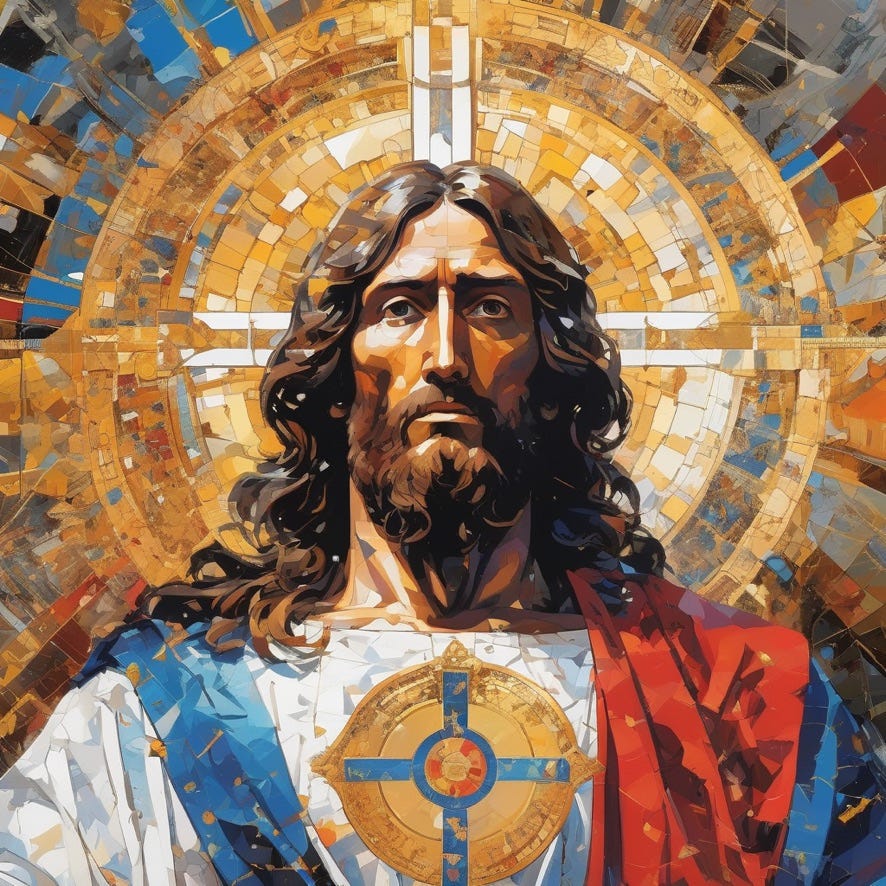Ziklag F4.26 - Beware the Wolf
SOS, Without Flesh, Memorizing Psalms, and On Councils and Boards
SOS Discipline - Daily Proverb and Red Letter Reader
Cynicism makes it worse. Even silence may still wrath. cf Pr. 29:8
Beware the wolf, for it does not graze. cf Mt. 7.15
It is not the size that matters, but the quality of the signals between the receptors. cf Sun Tzu 5.2
From the Past for the Present
from Without Flesh
In 1939, the Nazis were marching through the streets on their way to “liberate” France. Since 1935, people of Hebraic descent had been ghettoed, but the true holocaust was not yet begun. Even so, the Christian chance to respond was already far past. The 1934 Barmen Declaration, signed by many Christian pastors as a rejection of the Nazi control of the churches, had done nothing to slow infiltration of Nazi ideology and power in both congregations and culture. Now the pulpits were preached in by double agents. Now the Gospel was outlawed as an offense to Arian morality. Now, Dr. Herman Sasse, ever stalwart and brave confessor, first among his colleagues to speak out against the fascist propagandas when they originally appeared, decided to write an open letter to the world about the grave situation they faced.
His topic of choice? The Lord’s Supper.
With Christianity in shambles, with the buildings entirely lost to the activities of an alien and hostile power, with the bad people in control and the good people too terrified to speak, Sasse, with pristine, cosmic insight, like the prophets of old, ignored the frills and distractions of immediacy, and took an axe to the root.
To understand why, is in part, the purpose of this book. For while it may seem on the surface that we live in times a million ideas removed from the depths of Nazi Germany, appearances can be deceiving. Humanity has not changed. Our doubtfulness has not changed. Our tendency toward hysteria has not changed.
But Sasse’s reasoning will have to work its own magic. To see with his precision, you will need to make room for his arguments. To perceive where present and past combine, you will need to sit for a while with the eternal. This begins not at the Lord’s Supper itself, but at its root. At the Church’s root. At Christianity’s root. With Jesus Christ himself.
From Today’s Stack
Thank You for SonsofSolomon.net
Pastor Fisk,
I am writing first to try to maintain a connection with you and your excellent work in Rockford, and second to thank you for your continued faithfulness and commitment to the Word of God.
Specifically, your emphasis on the Psalms has been transformative for me, as they have become the daily bread for my soul. First because of my father and then because of your influence from afar, I've made it a goal to memorize the book like apparently everybody used to do back in the day, which has been very gratifying so far.
I'm learning that it's not about the goal but about the daily time driving away the demons through the Word of God and prayer. My focus for the next 100 days will be learning Ps. 22, 78, and 118. That is my third purpose, to tell you I'm going to faithfully cling to those Psalms in addition to normal SoS, so as to be less alone in this effort at discipline. My closest brotherhood is here at home, but your part in this makes it meaningful for me that you in some way continue to be a part of this life of prayer. We are connected by these same prayers, this same language, this common trust built by the Words of the living God. God be praised!
130 | Si vis pacem, para bellum.
27 | Do not be afraid. Christ is risen.
Most excellent. Currently my day is:
123, 125, 127, Creed, LP, 10C, 121, 91, 23, 119:M+3, 55, 56, 54, 118, Jer 30-31, Prov 3, 124, 129, 149, 126, 128, 130, 131, and I count myself deprived. But I count myself blessed!
I do often fail to get to 130/131. They are dear to me.
My moniker for the year is 119:45, so I am happy to find free moments of repentance regarding the discipline at every turn in the exultation and knowledge that this well will never run dry.
Just this week I decided to add 34 and 35 right after 149 or 128.
I also have much of this set to music.
Pax Christiana!
VII. Council and Boards
a. The congregation shall elect from its communicant membership, in Christian order, the number of persons necessary with the pastor(s) to constitute a Congregational Council and a Board of Elders which, within the limits of their offices, shall see that all needful public matters are attended to in good order.
From this point on, we really get into the nuts and bolts of the constitution. Our goal has been to go back to the roots, strip away the excess that built up over the years, and leave us with clean slate for doing the Church’s business. This also means trying to put down on paper only the things absolutely need doing.
We have a voting assembly that holds all decision making authority beyond the constitution. But the constitution will vest that authority in a variety of offices. Those chosen representatives of the assembly work in two distinct groups, two “branches” of congregational government; the “Council” and the “Elders.” Notice that there are not two boards. Rather, there is a board and a council.
The Congregational Council exists as the officers of the voting assembly. It’s task is to provide transparency and order to the assembly process. It does not rule or make decisions on its own, but decides what items are important enough for everyone to need to hear about it.
The Board of Elders exists as the fatherly leadership of the congregation. It’s task is to both provide a check on the congregation on behalf of the pastor, as well as to provide a check on the pastor on behalf of the congregation. The Board does make decisions, often without full disclosure, because not everything is everyone’s business. For that reason, we elect established, pious men, who are committed to knowing both Scriptures and Confessions to be our congregation’s governance board. Conflict, when it exists is the parish, is the purview of the board before it is the purview of the voters.
Much more could be said, but this is nothing new. This is the operating principles we already have.
b. The Congregational Council shall have the responsibility for: (1) the stewardship of congregational real properties (2) the stewardship of congregational financials, including oversight of the Endowment Fund, (3) the holding of regular congregational meetings.
c. The Board of Elders shall have the responsibility for the care of the pastoral call.
Notice how there is a clean division between the things of the world and the things of heaven. The Voting Assembly, at the leadership of the Congregational Council, looks out for the money, (which means, the properties, too.) The Board of Elders looks out for the work of the Church.
The only reason you give money to SP815 is to support the work of the Church. The only reason we have a building is to gather for the work of the Church. The reason you call a pastor to preach is because that is the work of the Church. When the pastor preaches well, you hear, are enlivened, and speak up for yourself with wisdom and hope. That is the work of the Church too.
For this reason, most of the other jobs you might remember as belonging to boards, really belong under the board of elders. In the late ’70’s somebody made a lot of money selling books to churches about how more boards meant more mission. But what it really meant was more worn down volunteers.
Don’t worry. Nothing is changing. We have been operating and thriving without any regularly meeting boards since almost the moment I walked in the door back in 2018. The work is getting done, and that’s the pleasant thing. The less you tell people on paper how they have to do the work, the simpler it is to get the work done.
That’s our goal.
d. To achieve this... will have to wait for next week.





